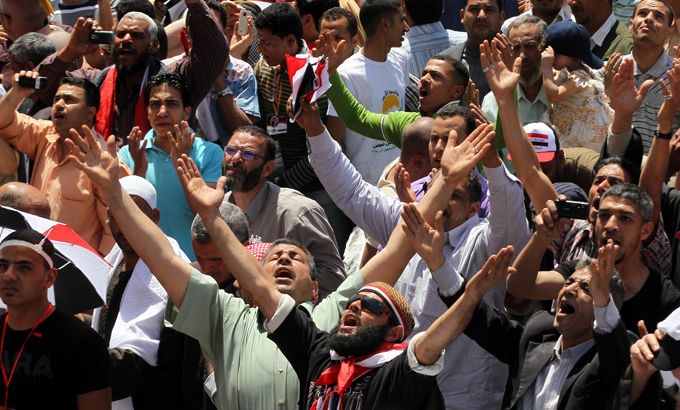
Is the Muslim Brotherhood in crisis?
As Egyptians rally to ‘rescue the revolution’, we ask if divisions are emerging among those once united behind it.
Thousands of Egyptians have rallied once again – this time under the banner of protecting the revolution. But as moderates, Salafists and the Muslim Brotherhood gathered in Cairo’s Tahrir Square, are the divisions beginning to show between the groups that were once united behind the revolution?
|
“The Muslim Brotherhood is part of the revolution …. We [the Muslim Brotherhood] are not alienating ourselves. Actually, we are going through a course of change here in Egypt.“ – Nader Omran of the Muslim Brotherhood’s Freedom and Justice Party |
And as the presidential election looms, have the Muslim Brotherhood and the ruling military council misjudged the political landscape?
It was not so long ago that it seemed that the Muslim Brotherhood would be the main beneficiary of last year’s revolution in Egypt. Indeed, the parliamentary elections saw the Brotherhood’s Freedom and Justice Party installed as the most dominant force in the chamber, and the party’s voice was growing in influence across the country.
But in the months following the elections, the party has been accused of an inconsistent and indecisive political strategy – one that has put it at odds with both the ruling military and the other parties behind the country’s revolution.
Among the factors that have affected the Muslim Brotherhood’s fortunes, is the fact that in March, the group reversed its position on the presidential election. Initially, it had said that it would not field a candidate. But then the Brotherhood decided to take part, and when its candidate of choice was disqualified, it selected another.
|
“The Muslim Brotherhood hasn’t been participating in the revolution. They have been the last to show up and the first to leave every time. We’ve seen them running after seats in the parliament and now the presidential elections and only coming back out onto the streets when they don’t get what they want as far as political gains. We haven’t seen them advocating any of the actual demands of the revolution.“ – Sherif Gaber, an Egyptian activist |
Accusations of hypocrisy also followed Brotherhood demands that the Supreme Council of the Armed Forces (SCAF) amend Article 28 of the constitution. That clause gives immunity to the elections commission. The Brotherhood had previously supported SCAF over the constitution.
Also, earlier this month, a Cairo court ruled that the Muslim Brotherhood’s dominance over the committee that would draft a new constitution was unconstitutional.
So, is Egypt’s Muslim Brotherhood going through a crisis? And is it alienating itself from some of the other parts of the revolution?
Joining Inside Story with presenter Teymoor Nabili to discuss this are: Nader Omran, a representative and co-founder of the Freedom and Justice Party, which is part of the Muslim Brotherhood; Sherif Gaber, an activist and advocate for housing rights who has been taking part in some of the protests over the last year following Egypt’s revolution; and Abdullah al-Arian, an assistant professor of Middle East history at Wayne State University and a scholar specialising in Islamic movements.
|
“We’ve seen the Muslim Brotherhood, for instance, at a certain point in its time espouse a certain revolutionary ideology, but I think over time the trend has been to try and seek more accommodation with the regime. And we’ve seen that from the 1980s going forward, especially in its growing relationship with the Mubarak regime as kind of the chief, sort of semi-accepted opposition.” Abdullah al-Arian, an assistant professor of Middle East history |
FACTS: EGYPT’S PRESIDENTIAL ELECTION
- Protesters have rallied under a banner that read ‘rescuing the revolution’
- Voting in Egypt’s presidential election is due to start on May 23
- The election commission has released a list of those running for the presidency
- The list confirms that Ahmed Shafiq is included among the 13 candidates
- The Muslim Brotherhood is against allowing Ahmed Shafiq to run for the presidency
- Many of Egypt’s voters are thought to be undecided over who to support in the election
- If no candidate wins more than 50 per cent of the vote, the election will go to a second round
- The winner of Egypt’s presidential election is to be declared on June 21
- Mohamed Morsi is running as the Muslim Brotherhood candidate
- Morsi took Khairat al-Shater’s place as presidential candidate for the Muslim Brotherhood